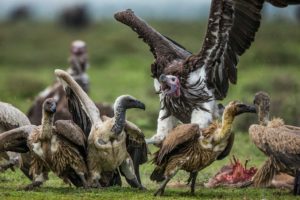BirdLife Africa has said that the launch of the West African Vulture Conservation Action Plan (WAVCAP), which held on Wednesday, April 24, 2024, marks a significant milestone in the efforts to safeguard vultures in the subregion.

Vultures, essential for maintaining ecological balance by scavenging on decaying carcasses, have experienced alarming declines, with African vulture populations plummeting by 80-97% over the last five decades, with some species facing a decline of over 92%.
The main threats include poisoning (responsible for 61% of recorded vulture deaths across Africa); belief-based use (29%); and electrocution by energy infrastructure (9%). Halting and reversing these declines is imperative to prevent vultures from becoming extinct, said the group.
“In West Africa, widespread poisoning of vultures for belief-based use poses a severe threat, with incidents such as mass poisoning in Guinea-Bissau in 2020 resulting in the death of over 2000 Critically Endangered Hooded Vultures. Other threats in the region include direct killing for meat and habitat destruction. Urgent intervention is needed to address these unsustainable losses,” BirdLife submitted in a statement.
According to the organisation, the development of the WAVCAP is a result of collaborative efforts involving individuals and institutions dedicated to vulture conservation. The Plan, it added, aims to address key threats faced by vultures in West Africa, with a focus on reducing the imminent threat posed by belief-based use.
“The vision of the WAVCAP is to ensure that, by 2043, vulture populations across West Africa have achieved sustainable levels, have become protected by effective legal frameworks, and are thriving in a healthy environment in harmony with people. The Plan targets actions to be carried out across 16 countries: Benin, Burkina Faso, Cameroon, Chad, Côte D’Ivoire, Gambia, Ghana, Guinea, Guinea-Bissau, Liberia, Mali, Niger, Nigeria, Senegal, Sierra Leone, and Togo. While ambitious, this vision is essential for the conservation of vultures in the subregion.”
The WAVCAP is said to build upon the groundwork laid by the CMS Multi-species Action Plan to Conserve African-Eurasian Vultures (Vulture MsAP) and responds directly to the CMS Resolution 12.10 (Rev.COP14) on Conservation of Arican-Eurasian Vultures. It urges CMS Parties and non-Parties to implement the Plan and emphasises the need for subregional and international collaboration to safeguard vulture populations. Further, the Plan calls for action from governments, civil society, academia, and local communities to commit to saving Africa’s vultures.
Dr Iziaq Kunle Salako, Federal Minister of State, Environment, Nigeria, said: “The vulture bird is an important member of our ecosystem that does the dirty work of cleaning our environment of carcasses, keeping it healthy and preventing diseases. Vultures are also our important ally in preventing illegal poaching. Unfortunately, over the years, their survival has become threatened by indiscriminate harvesting for use in traditional medicine and deliberate poisoning by illegal poachers.
“The West Africa Vulture Conservation Action Plan, which spells out the critical actions we need to undertake to save the vulture, is therefore a commendable initiative that I support on behalf of the Federal Ministry of Environment, Nigeria. The change we seek can only come from making commitments to save these birds as enshrined in the Plan.”
Ms. Rouba Abou-Atieh, Executive Coordinator of the CMS Office – Abu Dhabi, that hosts the Coordinating Unit of the Raptors MOU, said: “Vultures play a vital role in our natural ecosystems and cultural heritage. Their presence is not only enriching but also essential for maintaining a healthy environment. The decline of vulture populations in South Asia resulted in a surge of diseases, leading to over 500,000 additional human deaths within just a few years. It is imperative to prevent similar consequences in Africa. The Raptors MOU serves as a mechanism for fostering international collaboration to safeguard vulture populations, ensuring they can continue to provide crucial ecosystem services vital for environmental integrity and human well-being.”
Mr. Kariuki Ndang’ang’a, Regional Director for Africa, BirdLife International, said: “The West Africa Vulture Conservation Action Plan could not have come at more opportune time. As vultures continue to decline, our efforts and actions should match the vulture crisis. With Africa being home to 11 species vultures of which six are known to occur in West Africa the continent should be on the forefront of saving the species. I am hopeful, that the coordinated operationalisation of WAVCAP, and support from key stakeholders including governments and local communities will turn the tide for vultures in West Africa.”
